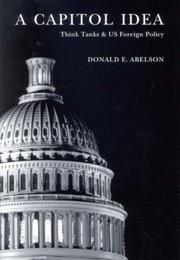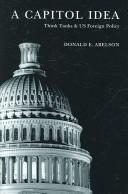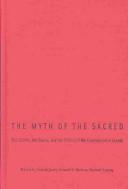| Listing 1 - 10 of 12 | << page >> |
Sort by
|
Book
ISBN: 0333649443 Year: 1996 Publisher: Basingstoke Macmillan
Abstract | Keywords | Export | Availability | Bookmark
 Loading...
Loading...Choose an application
- Reference Manager
- EndNote
- RefWorks (Direct export to RefWorks)
Book
ISBN: 9780773536074 Year: 2009 Publisher: Montreal : McGill-Queen's University Press,
Abstract | Keywords | Export | Availability | Bookmark
 Loading...
Loading...Choose an application
- Reference Manager
- EndNote
- RefWorks (Direct export to RefWorks)

ISBN: 9780773531154 0773531157 Year: 2006 Publisher: Montreal Kingston London : McGill-Queen's University Press,
Abstract | Keywords | Export | Availability | Bookmark
 Loading...
Loading...Choose an application
- Reference Manager
- EndNote
- RefWorks (Direct export to RefWorks)
Research institutes --- Political planning --- Centres de recherche --- Politique publique --- United States --- Etats-Unis --- Foreign relations. --- Relations extérieures --- Défense --- Clubs de réflexion -- États-Unis --- Relations internationales --- États-Unis --- Prise de décision --- Relations extérieures --- Relations militaires --- Politique et gouvernement

ISBN: 0773569901 9780773569904 0773523162 9780773523166 0773523170 9780773523173 9780773575417 9780773553866 077355386X 0773575413 9780773536074 0773536078 9780773536081 0773536086 1282865919 9781282865914 9786612865916 6612865911 0773580387 Year: 2009 Publisher: Montreal [Que.] McGill-Queen's University Press
Abstract | Keywords | Export | Availability | Bookmark
 Loading...
Loading...Choose an application
- Reference Manager
- EndNote
- RefWorks (Direct export to RefWorks)
Do Think Tanks Matter? evaluates the influence and relevance of public policy institutes in today's political arena. Many journalists and scholars believe the explosion of think tanks in the latter part of the twentieth century indicates their growing importance in the policy-making process. This perception has been reinforced by directors of think tanks, who often credit their institutes with influencing major policy debates and government legislation. Yet the basic question of how and in what way they influence public policy has, Donald Abelson contends, frequently been ignored. Abelson studies the experiences of think tanks in the United States, where they have become an integral feature of the political landscape, and in Canada, where their numbers have grown considerably in recent years but where, compared to their U.S. counterparts, they enjoy less prominence in policy-making. By focusing on the policy cycle, issue articulation (that is, getting issues on the political agenda) and policy formation and implementation (actually affecting the outcome of policies already on the political agenda), he argues that think tanks have sometimes played an important role in shaping the political dialogue and the policy preferences and choices of decision-makers, but often in different ways and at different stages of the policy cycle.
BUSINESS & ECONOMICS --- Decision-Making & Problem Solving --- Policy sciences --- Research institutes --- Social Sciences - General --- Social Sciences --- Institutes, Research --- Research centers --- Think tanks --- Universities and colleges --- Learned institutions and societies --- Policy-making --- Policymaking --- Public policy management --- #SBIB:022.IOS --- #SBIB:324H14 --- #SBIB:35H004 --- Politologie: verenigingen, vergaderingen, congressen, colloquia --- Bestuurswetenschappen: onderwijs en onderzoek --- Policy sciences. --- Research institutes. --- Sciences de la politique --- Centres de recherche --- USA --- Kanada --- Politique publique --- Canada --- États-Unis
Book
ISBN: 077359972X 9780773599727 9780773599734 0773599738 9780773547636 0773547630 9780773547643 0773547649 Year: 2016 Publisher: Montreal Kingston London Chicago
Abstract | Keywords | Export | Availability | Bookmark
 Loading...
Loading...Choose an application
- Reference Manager
- EndNote
- RefWorks (Direct export to RefWorks)
Think tanks are often thought of as a uniquely US phenomenon. Although the largest concentration of think tanks is in the United States, they can be found in virtually every country. Often overlooked, Canada’s think tanks represent a highly diverse and eclectic group of public policy organizations such as the Canadian Centre for Policy Alternatives, the C.D. Howe Institute, the Fraser Institute, and the Mowat Centre among others. In Northern Lights, Donald Abelson explores the rise of think tanks in Canada and addresses many of the most commonly asked questions about how, and under what circumstances, they are able to affect public opinion and public policy. He identifies the ways in which Canadian think tanks often prioritize political advocacy over policy research, and seeks to explain why these organizations are well-suited and equipped to shape the discourse around key policy issues. The first comprehensive examination of think tanks in Canada, Northern Lights is both a primer for those looking to understand the role and function of think tanks in the policy-making process and a guide to the leading policy institutes in the country.
Research institutes --- Policy sciences --- Policy-making --- Policymaking --- Public policy management --- Institutes, Research --- Research centers --- Think tanks --- Universities and colleges --- Learned institutions and societies
Book
ISBN: 9780773553859 0773553851 0773553258 9780773553255 077355324X 9780773553248 9780773553866 077355386X Year: 2018 Publisher: Montreal Kingston McGill-Queen's University Press
Abstract | Keywords | Export | Availability | Bookmark
 Loading...
Loading...Choose an application
- Reference Manager
- EndNote
- RefWorks (Direct export to RefWorks)
It is often assumed that think tanks carry enormous weight with lawmakers and other key stakeholders. In Do Think Tanks Matter? Donald Abelson argues that the question of how think tanks have evolved and under what conditions they can and do have an impact continues to be ignored. Think tank directors often credit their institutes with influencing major policy debates and government legislation, and many journalists and scholars believe the explosion of think tanks since the latter part of the twentieth century is indicative of their growing importance in the policy-making process. Abelson goes beyond assumptions, highlighting both the visibility and relevance of public policy institutes in what has become a contentious and polarized political arena in the United States, and in Canada, where, despite recent growth in numbers, they enjoy less prominence than their US counterparts. By focusing on how think tanks engage in issue articulation, policy formation, and implementation, Abelson argues that they have helped to shape the political dialogue and the policy preferences and choices of decision-makers, but in different ways and at different stages of the policy cycle. This expanded and revised third edition includes additional institutional profiles of key think tanks, an updated chapter on presidents and think tanks, a new chapter on the efforts of a group of public policy institutes to shape the discourse around the possible construction of the controversial Keystone XL pipeline, and dozens of new graphs and tables that track the public visibility and perceived policy relevance or impact of top-tier think tanks.
Policy sciences. --- Research institutes --- Institutes, Research --- Research centers --- Think tanks --- Universities and colleges --- Learned institutions and societies --- Policy-making --- Policymaking --- Public policy management

ISBN: 0773580395 1282866443 9786612866449 0773575979 9780773575974 0773531157 9780773531154 9780773580398 9781282866447 6612866446 Year: 2006 Publisher: Montreal [Que.] McGill-Queen's University Press
Abstract | Keywords | Export | Availability | Bookmark
 Loading...
Loading...Choose an application
- Reference Manager
- EndNote
- RefWorks (Direct export to RefWorks)
Abelson focuses on a host of high profile think tanks - including the Brookings Institution, the Heritage Foundation, and the Project for the New American Century - and on the public and private channels they rely on to influence important and controversial foreign policies, including the development and possible deployment of a National Missile Defense and George Bush's controversial war on terror. In the process of uncovering how some of the nation's most prominent think tanks have established themselves as key players in the political arena, he challenges traditional approaches to assessing policy influence and suggests alternative models.
Research institutes --- Political planning --- History. --- United States --- Foreign relations.

ISBN: 1283530015 9786613842466 0773570578 9780773570573 9780773524347 0773524347 0773524355 9780773524354 9781283530019 661384246X Year: 2002 Publisher: Montreal McGill-Queen's University Press
Abstract | Keywords | Export | Availability | Bookmark
 Loading...
Loading...Choose an application
- Reference Manager
- EndNote
- RefWorks (Direct export to RefWorks)
A title that challenges the "myth of the sacred" - the idea that certain aspects of the constitutional process - judicial political behaviour, interest group politics, and centralization of power - are untouchable politically.
Political questions and judicial power --- Civil rights --- Judicial activism --- Judicial power and political questions --- Act of state --- Administrative discretion --- Judicial review --- Jurisdiction --- Law --- Rule of law --- Separation of powers --- Political aspects --- Canada. --- Politique et pouvoir judiciaire --- Droits de l'homme
Book
ISBN: 0773549455 0773549463 9780773549463 9780773549456 9780773549432 0773549439 9780773549449 0773549447 Year: 2017 Publisher: Montreal Chicago
Abstract | Keywords | Export | Availability | Bookmark
 Loading...
Loading...Choose an application
- Reference Manager
- EndNote
- RefWorks (Direct export to RefWorks)
Human migration has reached an unprecedented level, and the numbers are expected to continue growing into the foreseeable future. Host societies and migrants face challenges in ensuring that the benefits of migration accrue to both parties, and that economic and socio-cultural costs are minimized. An insightful comparative examination of the policies and practices that manage and support immigrants, Twenty-First-Century Immigration to North America identifies and addresses issues that arose in the early years of the twenty-first century and considers what to expect in the years ahead. The volume begins with an overview of immigration policies and practices in the United States and Canada, then moves to an investigation of the economic and socio-cultural aspects, and concludes with a dialogue on precarious migration. Taking a multidisciplinary approach, the editors include research from the areas of psychology, political science, economics, sociology, and public policy. Underscoring the complicated nature of immigration, this collection aims to foster further discussion and inspire future research in the United States and Canada.
Immigrants --- Emigrants --- Foreign-born population --- Foreign population --- Foreigners --- Migrants --- Persons --- Aliens --- History --- Canada --- United States --- Emigration and immigration --- ABŞ --- ABSh --- Ameerika Ühendriigid --- America (Republic) --- Amerika Birlăshmish Shtatlary --- Amerika Birlăşmi Ştatları --- Amerika Birlăşmiş Ştatları --- Amerika ka Kelenyalen Jamanaw --- Amerika Qūrama Shtattary --- Amerika Qŭshma Shtatlari --- Amerika Qushma Shtattary --- Amerika (Republic) --- Amerikai Egyesült Államok --- Amerikanʹ Veĭtʹsėndi︠a︡vks Shtattnė --- Amerikări Pĕrleshu̇llĕ Shtatsem --- Amerikas Forenede Stater --- Amerikayi Miatsʻyal Nahangner --- Ameriketako Estatu Batuak --- Amirika Carékat --- AQSh --- Ar. ha-B. --- Arhab --- Artsot ha-Berit --- Artzois Ha'bris --- Bí-kok --- Ē.P.A. --- EE.UU. --- Egyesült Államok --- ĒPA --- Estados Unidos --- Estados Unidos da América do Norte --- Estados Unidos de América --- Estaos Xuníos --- Estaos Xuníos d'América --- Estatos Unitos --- Estatos Unitos d'America --- Estats Units d'Amèrica --- Ètats-Unis d'Amèrica --- États-Unis d'Amérique --- Fareyniḳṭe Shṭaṭn --- Feriene Steaten --- Feriene Steaten fan Amearika --- Forente stater --- FS --- Hēnomenai Politeiai Amerikēs --- Hēnōmenes Politeies tēs Amerikēs --- Hiwsisayin Amerikayi Miatsʻeal Tērutʻiwnkʻ --- Istadus Unidus --- Jungtinės Amerikos valstybės --- Mei guo --- Mei-kuo --- Meiguo --- Mî-koet --- Miatsʻyal Nahangner --- Miguk --- Na Stàitean Aonaichte --- NSA --- S.U.A. --- SAD --- Saharat ʻAmērikā --- SASht --- Severo-Amerikanskie Shtaty --- Severo-Amerikanskie Soedinennye Shtaty --- Si︠e︡vero-Amerikanskīe Soedinennye Shtaty --- Sjedinjene Američke Države --- Soedinennye Shtaty Ameriki --- Soedinennye Shtaty Severnoĭ Ameriki --- Soedinennye Shtaty Si︠e︡vernoĭ Ameriki --- Spojené obce severoamerické --- Spojené staty americké --- SShA --- Stadoù-Unanet Amerika --- Stáit Aontaithe Mheiriceá --- Stany Zjednoczone --- Stati Uniti --- Stati Uniti d'America --- Stâts Unîts --- Stâts Unîts di Americhe --- Steatyn Unnaneysit --- Steatyn Unnaneysit America --- SUA (Stati Uniti d'America) --- Sŭedineni amerikanski shtati --- Sŭedinenite shtati --- Tetã peteĩ reko Amérikagua --- U.S. --- U.S.A. --- United States of America --- Unol Daleithiau --- Unol Daleithiau America --- Unuiĝintaj Ŝtatoj de Ameriko --- US --- USA --- Usono --- Vaeinigte Staatn --- Vaeinigte Staatn vo Amerika --- Vereinigte Staaten --- Vereinigte Staaten von Amerika --- Verenigde State van Amerika --- Verenigde Staten --- VS --- VSA --- Wááshindoon Bikéyah Ałhidadiidzooígíí --- Wilāyāt al-Muttaḥidah --- Wilāyāt al-Muttaḥidah al-Amirīkīyah --- Wilāyāt al-Muttaḥidah al-Amrīkīyah --- Yhdysvallat --- Yunaeted Stet --- Yunaeted Stet blong Amerika --- ZDA --- Združene države Amerike --- Zʹi︠e︡dnani Derz︠h︡avy Ameryky --- Zjadnośone staty Ameriki --- Zluchanyi︠a︡ Shtaty Ameryki --- Zlucheni Derz︠h︡avy --- ZSA --- Η.Π.Α. --- Ηνωμένες Πολιτείες της Αμερικής --- Америка (Republic) --- Американь Вейтьсэндявкс Штаттнэ --- Америкӑри Пӗрлешӳллӗ Штатсем --- САЩ --- Съединените щати --- Злучаныя Штаты Амерыкі --- ولايات المتحدة --- ولايات المتّحدة الأمريكيّة --- ولايات المتحدة الامريكية --- 미국 --- Canada (Province) --- Canadae --- Ceanada --- Chanada --- Chanadey --- Dominio del Canadá --- Dominion of Canada --- Jianada --- Kʻaenada --- Kanada (Dominion) --- Ḳanadah --- Kanadaja --- Kanadas --- Ḳanade --- Kanado --- Kanakā --- Province of Canada --- Republica de Canadá --- Yn Chanadey --- Καναδάς --- Канада --- קאנאדע --- קנדה --- كندا --- کانادا --- カナダ --- 加拿大 --- 캐나다 --- Lower Canada --- Upper Canada --- Kaineḍā --- États-Unis --- É.-U. --- ÉU
Book
ISBN: 0367706938 0367706946 1003147569 1000564428 1000564444 1003147569 Year: 2022 Publisher: Routledge
Abstract | Keywords | Export | Availability | Bookmark
 Loading...
Loading...Choose an application
- Reference Manager
- EndNote
- RefWorks (Direct export to RefWorks)
| Listing 1 - 10 of 12 | << page >> |
Sort by
|

 Search
Search Feedback
Feedback About UniCat
About UniCat  Help
Help News
News